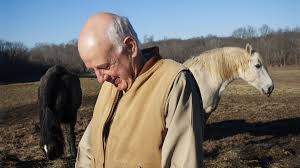Today’s farm equipment never fails to amaze with its power, size, and price. Successful farmers continually adapt to the changes in the industry and deal with it. To guess what changes might occur in the future is beyond the ability of this humble pencil pusher to guess. It’s much easier to look back to the time when he’d fire up an old “B” John Deere.
I’m talking about an older model “B” that didn’t have a battery starter. It had a flywheel crank and a petcock for each cylinder which needed to be opened for compression release. With a spin or two or three the engine caught. Those two cylinders started whooshing and pushing exhaust out those petcocks until you closed them again for full power.
There was a time when many-a two-cylinder “Poppin’ Johnny” could be heard and seen working in the countryside. But that engine possessed a fundamental weakness: it couldn’t grow. Engineers kept tweaking it as far as they could until they admitted they’d have to turn to four-cylinder engines, thus the 4010s and on into infinity.
Expounding on modern farm machinery soon reaches the limit of my intelligence, so it’s better to speak in historical terms. How about some oxen stories? We can safely guess no one living today ever saw them working in real-life, except maybe on some farm festival occasions. We’ve told the story of Don Stevenson and his large oxen-powered wagon train that supplied Fort Ransom when it was built. On their return trip to Fort Abercrombie his outfit stalled in a blizzard near Lisbon.
Not to be discouraged, Stevenson kept freighting westward that summer to the Missouri River. To cross, he rafted his wagons and swam the bulls across. One of his teamsters went to Stevenson with a problem, he couldn’t swim. A practical minded man, Stevenson said just grab a bull by the tail when they’re in the water and hang on. The teamster wasn’t confident that he’d be able to hang on all the way. He found some light rope, tied it to his wrist, and then knotted it on the selected critter’s tail.
When this unlikely pair hit the deep water, the bull looked back to see what was dragging and saw his unwanted passenger. As the story goes, the bull started to swim faster and beat them all to the opposite shore. And still that darn unwanted load kept hanging on which prompted the critter to stampede into the brush. That went on until the man became snagged on a stout bush, stopped short, and snapped the rope. He stood up, clothing torn, cut, bruised, and like bullwhackers were known to do gave forth with a stream of loud blue lingo. That evening while gathered around their campfire, the men laughed and described to the hapless one how funny he looked bouncing along on the prairie.
Another story comes out of the Sheldon area when a couple of teen-age boys were sent to a flour mill with a wagon filled with wheat and pulled by a team of oxen. Think of oxen plodding along with impatient teenagers seated on the wagon wishing they could go faster. It so happened the 4th of July had just occurred and fireworks could still be found. Here the reader’s imagination must stretch to accommodate the scene. Wondering and laughing about what might happen, they lit a small rocket and goosed one of the oxen with it.
The boys learned a powerful lesson that day when the firecracker struck the animal’s hide and exploded. They could do nothing but hang on because the panicked pair of oxen proved they could run, stampede, in fact. A wheel fell off and the wagon careened to the side of the trail, struck a tree, and broke up. They last saw the animals topping a rise and high-tailing for home. As for the boys, they walked.
A noteworthy lady named Nancy McClure once lived in the eastern part of the county at Owego told a story of how she became involved in the Dakota War of 1862. Even though she and her Indian husband were on friendly terms with these Indians their lives were threatened. State and county lines did not exist at the time so exact locations can’t be determined. It came time for them to flee the danger and her husband told her to saddle her horse. Now oxen enter the scene.
Her words paint the scene. “We saw a wagon, drawn by two yoke of oxen and loaded with people, coming down the road at a good trot. They were all in great fright. They asked us to put our horses to their wagon as they could travel faster than oxen and to get in with them. This we agreed to do, and soon had the change made. I took my dear little daughter and just as we were about to get in I looked up the road and saw the Indians coming.”
McClure’s story will end here for the time being, but she has earned a secure spot in Ransom County’s history. There is a book length tale to tell of her life. If only I live long enough! As for the story of how we power our implements or convey ourselves around, we can be assured more changes will come.




